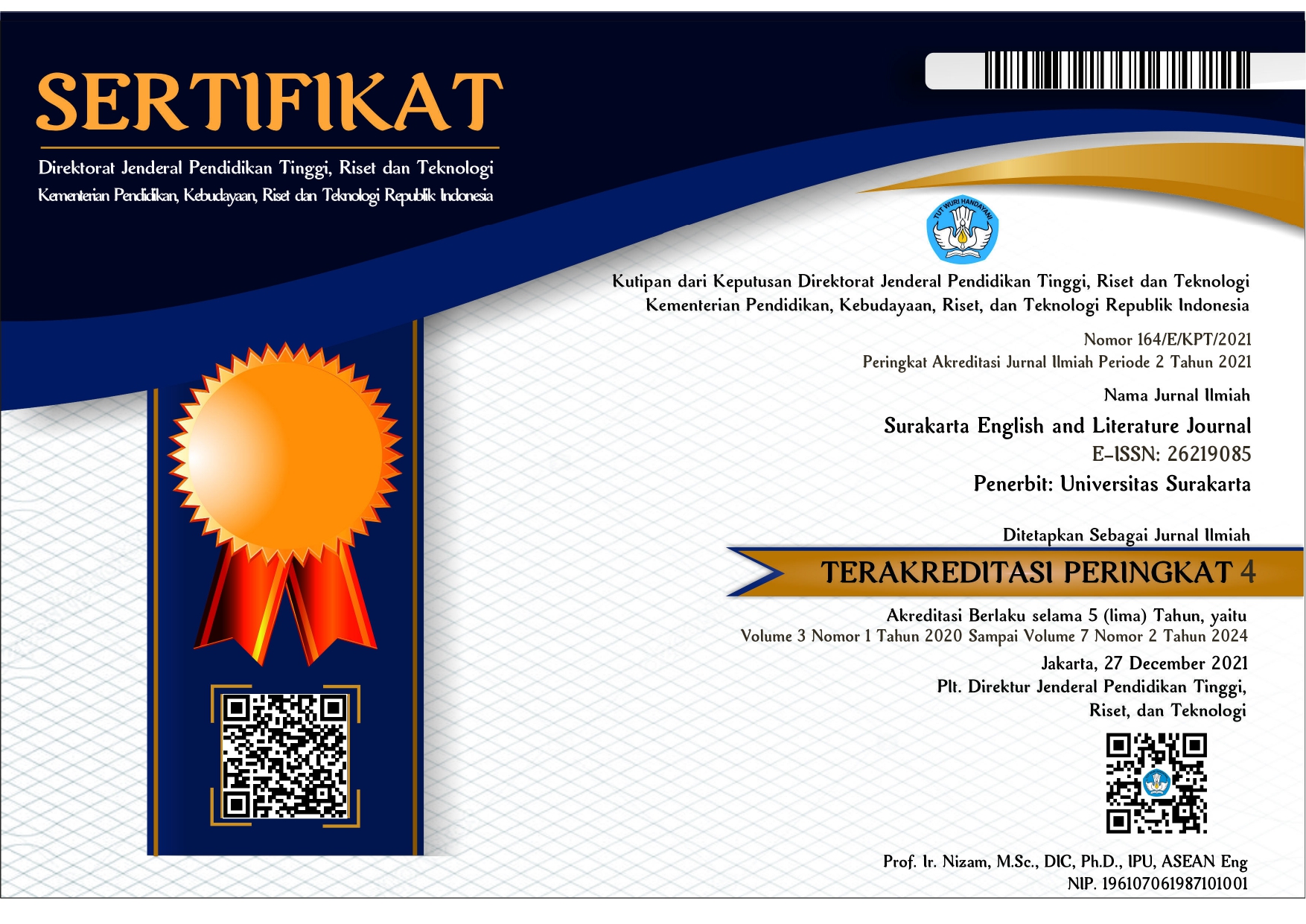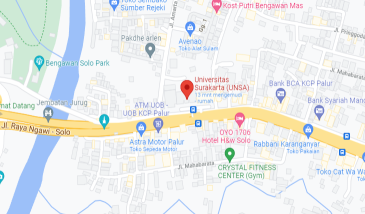Mapping Business English Researches Globally: A Bibliometric Analysis Using VOS Viewer
DOI:
https://doi.org/10.52429/selju.v6i2.149Keywords:
Bibliometric Analysis, Business English Research, VOS ViewerAbstract
The specific objectives of this study are 1) to describe the global business English research overview, 2) to describe business English research and Co-Authorship in English, and 3) to indicate research gaps and provide recommendations for further research in Business English. This was literature review research. The database in this research was the Scopus database which is accessed via https://www.sciencedirect.com/ page, and the data were articles published in Scopus. The data was analysed using VOSviewer software. The results of this research indicated that this research was related to the possibility of future research related to Business English, for example in general, when talking about Business English, the research setting in Indonesia was still limited to Scopus. It could be seen that the setting was still dominated by China and Singapore. In addition, Business English was closely related to the field of professional communication both in oral and written language. Then, the context of Business English research was focused on higher education, and has not touched on vocational high schools, where graduates are prepared to enter the world of work, for example, vocational high schools in the fields of hospitality, health and so on.
References
Ahmed Alsamadani, H. (2017). Needs Analysis in ESP Context: Saudi Engineering Students as a Case Study. Advances in Language and Literary Studies, 8(6), 58. https://doi.org/10.7575/aiac.alls.v.8n.6p.58
Amine, B., & Faiza, S. (2018). THE EFFECT OF PROCESS-GENRE APPROACH ON ESP STUDENTS’ ACHIEVEMENT IN WRITING BUSINESS LETTERS. European Journal of Research and Reflection in Educational Sciences. www.idpublications.org
Andrade, M. S., Hartshorn, K. J., Evans, N. W., & Davis, S. (2019). Good, better, Best: English language development practices in graduate business programs. International Journal of Management Education, 17(1), 36–46. https://doi.org/10.1016/j.ijme.2018.11.006
Arif, M., Damayanti, E., & Lusia, D. A. (2019). PENGARUH PENERAPAN ELINA MATA KULIAH BUSINESS ENGLISH UNTUK KELAS MAHASISWA PEKERJA DI UNIVERSITAS NAROTAMA. MOTORIC (Media of Teaching Oriented and Children), 3(1).
Arnó-Macià, E., Aguilar-Pérez, M., & Tatzl, D. (2020). Engineering students’ perceptions of the role of ESP courses in internationalized universities. English for Specific Purposes, 58, 58–74. https://doi.org/10.1016/j.esp.2019.12.001
Ávila-Cabrera, J. J., & Corral Esteban, A. (2021). The project SubESPSKills: Subtitling tasks for students of Business English to improve written production skills. English for Specific Purposes, 63, 33–44. https://doi.org/10.1016/j.esp.2021.02.004
Beckisheva, T. G., Gasparyan, G. A., & Kovalenko, N. A. (2015). Case Study as an Active Method of Teaching Business English. Procedia - Social and Behavioral Sciences, 166, 292–295. https://doi.org/10.1016/j.sbspro.2014.12.526
Budlova, T. Yu. (2014). The Storyline Approach in Teaching Business English to Linguistic Students. Procedia - Social and Behavioral Sciences, 154, 420–424. https://doi.org/10.1016/j.sbspro.2014.10.184
Carrió-Pastor, M. L., & Calderón, R. M. (2015). A Contrastive Analysis of Metadiscourse Features in Business E-mails Written by Non-native Speakers of English. Procedia - Social and Behavioral Sciences, 173, 214–221. https://doi.org/10.1016/j.sbspro.2015.02.055
Carrió-Pastor, M. L., & Muñiz-Calderón, R. (2013). The Compilation of a Corpus of Business English: Syntactic Variation. Procedia - Social and Behavioral Sciences, 95, 89–95. https://doi.org/10.1016/j.sbspro.2013.10.626
Carrió-Pastor, M. L., & Skorczynska, H. (2015). Collaborative Learning and Communication Technologies in Teaching Business English. Procedia - Social and Behavioral Sciences, 178, 32–37. https://doi.org/10.1016/j.sbspro.2015.03.142
Chan, C. S. C. (2017). Investigating a research-informed teaching idea: The use of transcripts of authentic workplace talk in the teaching of spoken business English. English for Specific Purposes, 46, 72–89. https://doi.org/10.1016/j.esp.2016.12.002
Chan, C. S. C. (2018). Proposing and illustrating a research-informed approach to curriculum development for specific topics in business English. English for Specific Purposes, 52, 27–46. https://doi.org/10.1016/j.esp.2018.07.001
Davidson, P. (2013). A practitioner’s commentary on Z. Zhang (2013) Business English students learning to write for international business: What do international business practitioners have to say about their texts? English for Specific Purposes, 32(3), 144–156. https://doi.org/10.1016/j.esp.2013.01.002
del Campo, C., Urquía-Grande, E., & Pascual-Ezama, D. (2023). Internationalizing the business school: A comparative analysis of English-medium and Spanish-medium instruction impact on student performance. Evaluation and Program Planning, 98. https://doi.org/10.1016/j.evalprogplan.2023.102279
Dina, T. A., & Ciornei, S. I. (2015). Developing Good Academic Practice on Learning Business English with Open Web-based Educational Resources: The Results of a Pilot Study. Procedia - Social and Behavioral Sciences, 203, 310–315. https://doi.org/10.1016/j.sbspro.2015.08.300
Doszhan, G. (2016). Semantic and Pragmatical Aspects of English Business Lexemes in Turkic Languages. Procedia Economics and Finance, 39, 24–31. https://doi.org/10.1016/s2212-5671(16)30236-2
Fielden-Burns, L. V., & Piquer-Píriz, A. M. (2022). Personification and relationships in English as a Medium of Instruction business discourse: Crossing paths in metaphorical constructions. Journal of Pragmatics, 202, 145–159. https://doi.org/10.1016/j.pragma.2022.11.002
Fiharsono, Albertus. (2011). Bahasa Inggris Dominasi Internet? Diakses dari Laman https://www.kompasiana.com/fiharsono/550070daa33311e072510ed6/bahasa-inggris-dominasi-internet pada 23 Agustus 2023 Kompasiana adalah platform blog. Konten ini menjadi tanggung jawab bloger dan tidak mewakili pandangan redaksi Kompas.
Gimenez, J. (2014a). Integrating multi-communication research and the business English class. English for Specific Purposes, 35(1), 1–16. https://doi.org/10.1016/j.esp.2013.11.002
Gimenez, J. (2014b). Multi-communication and the business English class: Research meets pedagogy. English for Specific Purposes, 35(1), 1–16. https://doi.org/10.1016/j.esp.2013.11.002
Goyal, R., & Rose, H. (2020). Stilettoed Damsels in Distress: the (un)changing depictions of gender in a business English textbook. Linguistics and Education, 58. https://doi.org/10.1016/j.linged.2020.100820
Holzmayer, F., & Schmidt, S. L. (2020). Dynamic managerial capabilities, firm resources, and related business diversification – Evidence from the English Premier League. Journal of Business Research, 117, 132–143. https://doi.org/10.1016/j.jbusres.2020.05.044
Hosseini, A., & Shokrpour, N. (2019). Exploring motivating factors among Iranian medical and nursing ESP language learners. Cogent Arts and Humanities, 6(1). https://doi.org/10.1080/23311983.2019.1634324
Jiang, Y. (2022). Evaluation of the pedagogical impact of Business English textbooks on teaching critical thinking skills. Heliyon, 8(11). https://doi.org/10.1016/j.heliyon.2022.e11419
Johns, A. M., & Dudley-Evans, T. (n.d.). English for Specific Purposes: International in Scope, Specific in Purpose.
Komori-Glatz, M. (2015). Exploring the Roles of English: English as a Lingua Franca in Master’s Programmes at WU Vienna University of Economics and Business. Procedia - Social and Behavioral Sciences, 173, 119–124. https://doi.org/10.1016/j.sbspro.2015.02.040
Kompas (2022). Indonesia Posisi Ke-81 dari 111 Negara di Indeks Kecakapan Bahasa Inggris accessed from https://www.kompas.com/edu/read/2022/11/18/150428371/indonesia-posisi-ke-81-dari-111-negara-di-indeks-kecakapan-bahasa-inggris?page=all. August 26, 2023
Latif, F., & Shafipoor, M. (2013). Innovative Business English Methodology in Iran. Procedia - Social and Behavioral Sciences, 70, 629–633. https://doi.org/10.1016/j.sbspro.2013.01.102
Lăzărescu, A. (2013). Utopian Business English Course Delivery: Avoiding Dystopia in Class. Procedia - Social and Behavioral Sciences, 76, 446–450. https://doi.org/10.1016/j.sbspro.2013.04.143
Malyuga, E., & McCarthy, M. (2018). English and Russian vague category markers in business discourse: Linguistic identity aspects. Journal of Pragmatics, 135, 39–52. https://doi.org/10.1016/j.pragma.2018.07.011
Millot, P. (2017). Inclusivity and exclusivity in English as a Business Lingua Franca: The expression of a professional voice in email communication. English for Specific Purposes, 46, 59–71. https://doi.org/10.1016/j.esp.2016.12.001
Mu, Y., & Yu, B. (2023). Developing intercultural competence in college business English students: A study of innovative teaching in China. International Journal of Intercultural Relations, 92. https://doi.org/10.1016/j.ijintrel.2022.101747
Najeeb, Sabitha. S. R. (2013). The Business of Teaching English as a Second Language: A Libyan Case Study. Procedia - Social and Behavioral Sciences, 70, 1243–1253. https://doi.org/10.1016/j.sbspro.2013.01.184
NIickerson, Catherine., and Planken Brigitte (2015). Introducing Business Engish. Routledge.
Nimasari, E. P. (2018). An ESP Needs Analysis: Addressing the Needs of English for Informatics Engineering. JEES (Journal of English Educators Society), 3(1), 23–40. https://doi.org/10.21070/jees.v3i1.1085
Park, S., Jeon, J., & Shim, E. (2021). Exploring request emails in English for business purposes: A move analysis. English for Specific Purposes, 63, 137–150. https://doi.org/10.1016/j.esp.2021.03.006
Purnomo, Joko Hadi., Niswatin Nurul Hidayati, Rizka Dibi Arryanti Saputri, Siti Riska Novianti. (2023). Trend on E-Commerce Researches: A Portrait Using VOSviewer. Strategic: Journal of Management Sciences. Vol. 3 No. 2 (2023) DOI: https://doi.org/10.37403/strategic.v3i2.151
Prasodjo, P., Moksin, S., & Badrah Zaki, L. (2021). THE ACCURACY OF BUSINESS ENGLISH CURRICULUM TO STUDENTS’ COMMUNICATION PERFORMANCE: THE EFL STUDENTS’ PERCEPTION.
Qin, X. (2021). Business English visualization system based on video surveillance and the Internet of Things. Microprocessors and Microsystems, 80. https://doi.org/10.1016/j.micpro.2020.103639
Rao, Parupalli SRINIVAS. (2019). The Role Of English As A Global Language. Research Journal Of English (RJOE) Vol-4, Issue-1, 2019
Ria, T. N., & Malik, D. (2017). Syllabus design in Business English based on the needs of Economics students Article Info. Journal of English Language Teaching, 6(1). http://journal.unnes.ac.id/sju/index.php/elt
Rogerson-Revell, P. (2008). Commentary on Rogerson-Revell, P. (2008). Participation and performance in international business meetings. English for Specific Purposes, 27, 338–360. English for Specific Purposes, 27(3), 338–360. https://doi.org/10.1016/j.esp.2008.02.003
Rohmah, Z. (2005). ENGLISH AS A GLOBAL LANGUAGE: ITS HISTORICAL PAST AND ITS FUTURE. Jurnal Bahasa Dan Seni.
Sari, F., & Atmanegara, Y. (2018). Developing ESP Reading Materials for Accounting Students. Advances in Language and Literary Studies, 9(5), 1. https://doi.org/10.7575/aiac.alls.v.9n.5p.1
Saxon, P. J. (2010). A practitioner commentary: Flowerdew, J. and Wan, A. (2010). The linguistic and the contextual in applied genre analysis: The case of the company audit report. English for Specific Purposes 29 (2010), 78–93. English for Specific Purposes, 29(2), 78–93. https://doi.org/10.1016/j.esp.2009.07.001
Snodin, N. S., Higgins, J., & Yoovathaworn, S. (2017). How Thai businesses utilize English in their product names. Kasetsart Journal of Social Sciences, 38(2), 123–128. https://doi.org/10.1016/j.kjss.2016.10.002
Subero-Sáenz, Á. (2013). A researcher’s commentary on Stephen Evans’ “Just wanna give you guys a bit of an update": Insider perspectives on business presentations in Hong Kong (2013). English for Specific Purposes, 32(4), 195–207. https://doi.org/10.1016/j.esp.2013.05.003
Suciharita, R. (2021). IMPORTANCE OF THE ENGLISH LANGUAGE IN GLOBALIZATION. Research Journal of English Language and Literature (RJELAL).
Sun, B., & Fan, T. (2022). The effects of an AWE-aided assessment approach on business English writing performance and writing anxiety: A contextual consideration. Studies in Educational Evaluation, 72. https://doi.org/10.1016/j.stueduc.2021.101123
Tadema, U. (2014). Exploiting hypothetical reported speech in the business English classroom. English for Specific Purposes, 36(1), 35–46. https://doi.org/10.1016/j.esp.2014.03.005
Teodorescu, A. (2015). Mobile Learning and its Impact on Business English Learning. Procedia - Social and Behavioral Sciences, 180, 1535–1540. https://doi.org/10.1016/j.sbspro.2015.02.303
van Eck, N. J., & Waltman, L. (2010). Software survey: VOSviewer, a computer program for bibliometric mapping. Scientometrics, 84(2), 523–538. https://doi.org/10.1007/s11192-009-0146-3
Wagner, Anika. (2023). How to Improve Your Team’s Business English and Communication Skills. Accessed from https://www.babbelforbusiness.com/us/blog/business-english-communication/#:~:text=Business%20English%20refers%20to%20the,%2C%20emails%2C%20and%20phone%20conversations.
Wang, L., & Fan, J. (2020). Assessing Business English writing: The development and validation of a proficiency scale. Assessing Writing, 46. https://doi.org/10.1016/j.asw.2020.100490
Xiao, S., & Jin, Y. (2023). Working Towards a Proficiency Scale of Business English Writing: A Mixed-Methods Approach, Li Wang, Fan Jason. Springer Singapore, Singapore (2021). 189 pp ERU 119,99. ISBN: 978-981-16-5448-0. Assessing Writing, 55, 100695. https://doi.org/10.1016/j.asw.2023.100695
Xie, Q. (2023). Using business negotiation simulation with China’s English-major undergraduates for practice ability development. Heliyon, 9(6). https://doi.org/10.1016/j.heliyon.2023.e16236
Yu, Y., Li, Y., Zhang, Z., Gu, Z., Zhong, H., Zha, Q., Yang, L., Zhu, C., & Chen, E. (2020). A bibliometric analysis using VOSviewer of publications on COVID-19. Annals of Translational Medicine, 8(13), 816–816. https://doi.org/10.21037/atm-20-4235
Zagan-Zelter, D., & Zagan-Zelter, S. (2010). Teaching business English - A challenge both for students and academics. Procedia - Social and Behavioral Sciences, 3, 245–250. https://doi.org/10.1016/j.sbspro.2010.07.039
Zhang, Zuocheng (2013). Business English Student Learning to Write for International Business: What do International Business Practitioners Have to Say About Their Texts? English for Specific Purposes 32 (3), 144-156, 2013
Zhang, Z. (2023). Becoming a member of the business community. English for Specific Purposes, 71, 48–50. https://doi.org/10.1016/j.esp.2013.01.002
Downloads
Published
How to Cite
Issue
Section
License
Copyright (c) 2023 Niswatin Nurul Hidayati

This work is licensed under a Creative Commons Attribution-ShareAlike 4.0 International License.
Licensing for Data Publication
-
Open Data Commons Attribution License, http://www.opendatacommons.org/licenses/by/1.0/ (default)
-
Creative Commons CC-Zero Waiver, http://creativecommons.org/publicdomain/zero/1.0/
-
Open Data Commons Public Domain Dedication and Licence, http://www.opendatacommons.org/licenses/pddl/1-0/














